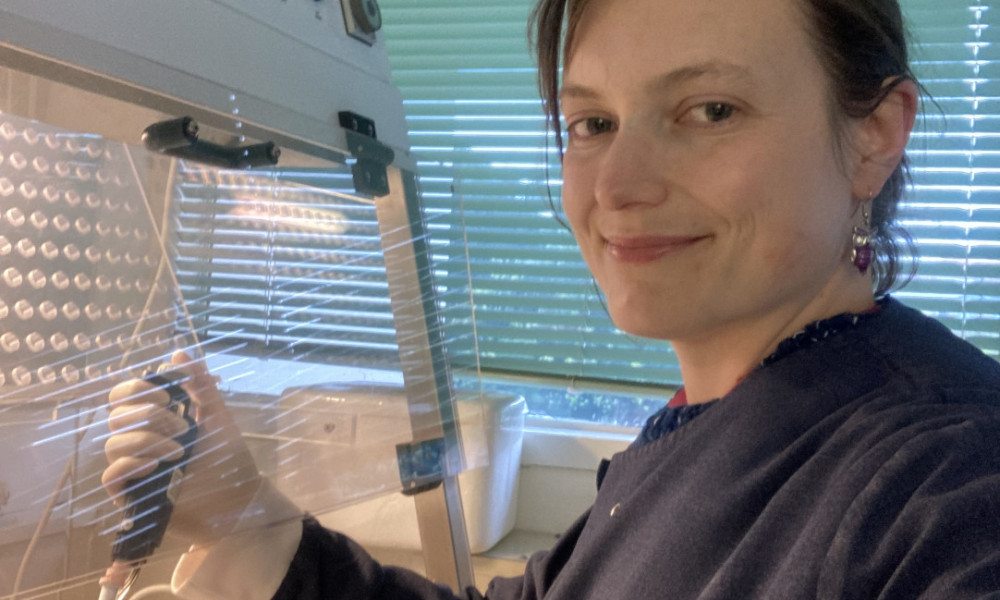Amy is a project lead in the Genomics and Bioinformatics team at the Institute of Environmental Science and Research (ESR). The Crown Research Institute works across several disciplines, including public health, water and environment, and food product safety.
Amy’s specialist area, genomics, is the research of an organism’s genetic material. The science has broad applications that impact our lives – including tracking and eliminating viral outbreaks in food products, to exploring medical breakthroughs in personalised medicine, which looks at how different people respond to treatments. It’s a highly specialised, skilled and vital field of work.
Amy’s role is one of more than 500 science roles that have been axed or are planned to be axed, as part of the Government’s savage cuts to the sector.
Limiting the cost of COVID-19
After COVID-19 hit our shores for the first time in early 2020, Amy was part of Aotearoa’s workforce of scientists working to understand and eliminate the virus. Amy’s specialisation was in tracking the growth and spread of the virus through genomic sequencing and surveillance.
“It was a very, very intense job for a while. Weekend work, dropping everything to work on it, responding to the crisis in front of us,” Amy says.
“There were a lot of things that we helped with by sequencing the COVID-19 genomes – avoiding another lockdown in Auckland, tracking and identifying the source of local outbreaks. We managed to save Auckland quite a lot of money in lost business.”
Amy and the rest of the Genomics and Bioinformatics team work on countless research projects that better Aotearoa – and the same can be said across the whole of ESR, and the wider science sector.
“We [at ESR] are working towards future pandemic preparedness, that's essential. Another [future goal] is point-of-care testing, rolling out sequencing capabilities to regional labs close to where the patient is being treated. Hospitals wouldn’t have an overnight delay while the samples are sent to us to receive and process – they’d be able to do it themselves. It would expedite patient care, particularly in critical cases.”
Defunding science
Despite the demonstrable value of their work to keep Aotearoa healthy, safe, and future-proofed, the science sector has weathered sparse budgets delivered by successive governments, made worse by ruthless cuts since the coalition Government took power in 2023.
“If the Government doesn't fund things, we're going to have to stop doing them,” she says.
Amy’s words have a chilling resonance. In the short term, tax cuts are given to landlords, and in the long term, our scientists, along with their vital work, dissipate, either to the private sector or overseas, leaving Aotearoa exposed to preventable risk.
“Scientific work requires very specialised people, essentially, and one of the issues we have is attracting and retaining people with that niche skill set.
“Because New Zealand is a low wage economy, we lose a lot of scientists overseas because they make more money in, say, Australia or the UK, and [the wages are] enough to justify paying interest on their student loans.
“Then, it's harder to attract people from overseas, to come to New Zealand and work with us. What we really need is to retain our skilled people in New Zealand. It's super important,” Amy says.
The impacts on science sector workers
There are many other science sector workers who are in the same shoes as Amy – facing another round of redundancies, a diminishing workforce, and financial uncertainty.
Much like the rest of our community and public services, full and consistent funding is essential to ensuring the science sector continues to deliver on what is crucial work.
“No one does this work by themselves - there's a huge team behind everything,” she says.
“While you might see one or two people on the news representing us, there’s a whole workforce behind them putting in the mahi to get the work done.”
As this article goes to print, it is undetermined where Amy will be heading after her role is made redundant.
The fight to save science
The PSA is an active, foundation member of the Save Science Coalition, which is made up of 29 scientific societies and unions, and opposes cuts to science funding and the loss of more than 500 vital science roles like Amy's.
In addition to opposing cuts, the goals of the Save Science Coalition are to highlight and catalogue what is being lost through the current cuts, defend support for world-leading indigenous research including mātauranga Māori, and make the case for a foundation of support for public science and re-committing to a target of 2% of GDP to be invested in research and development in Aotearoa New Zealand.
